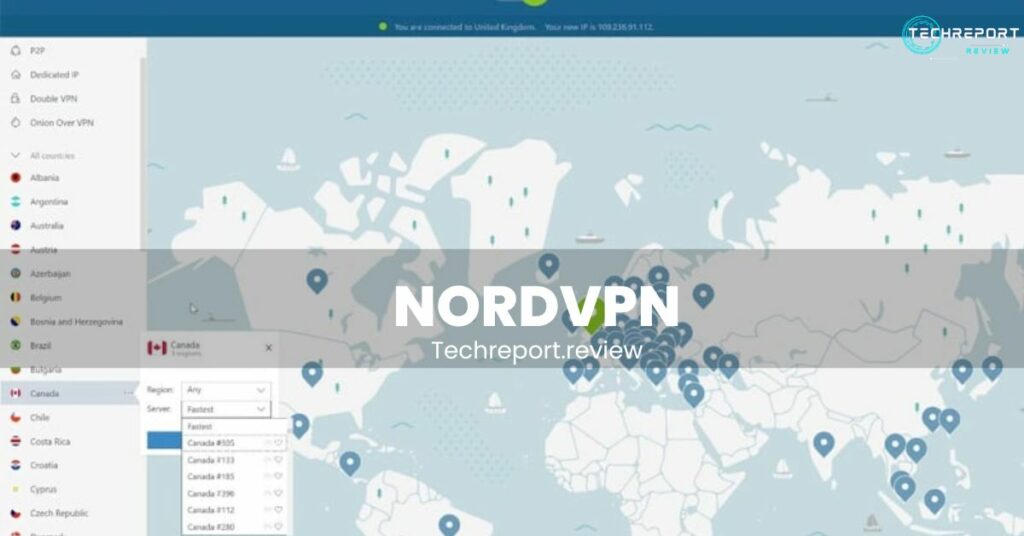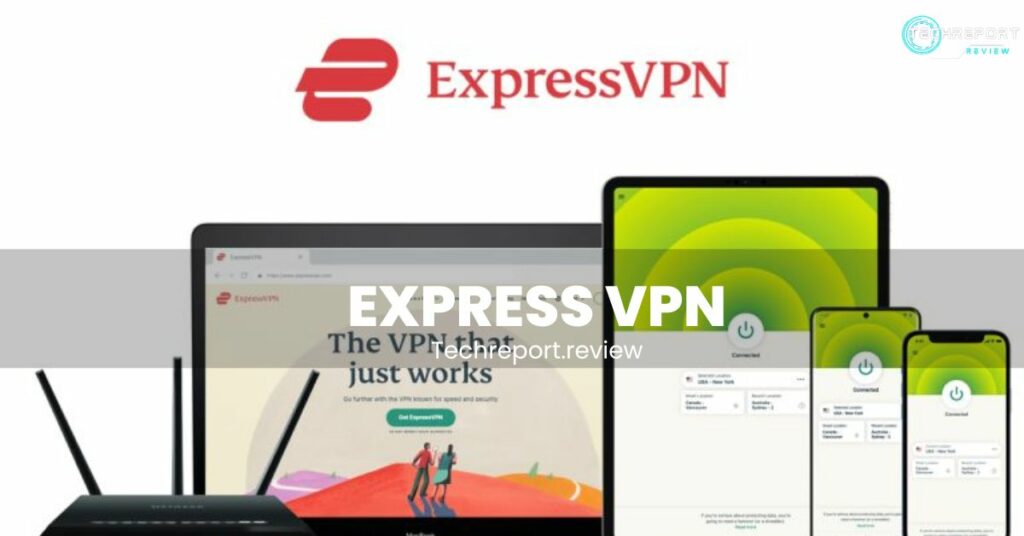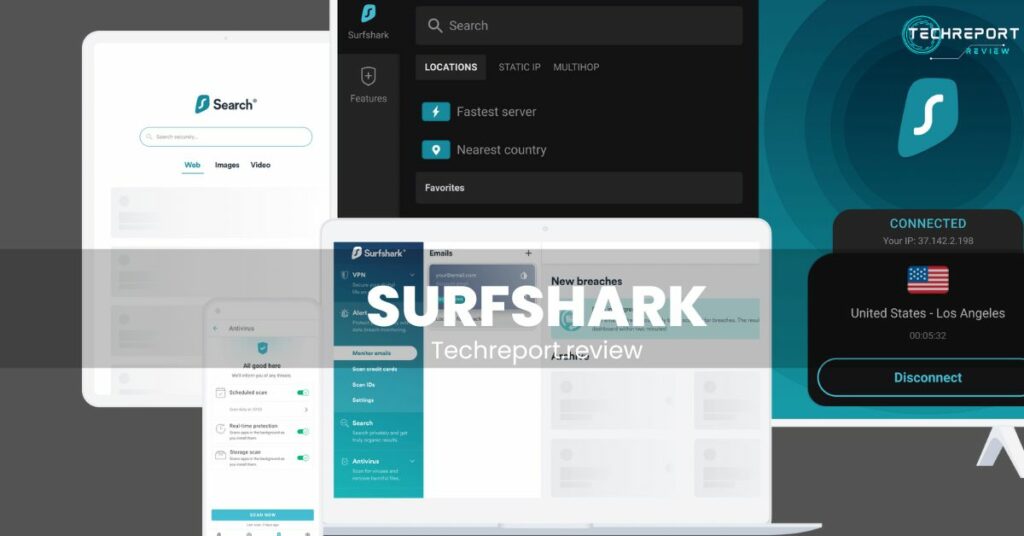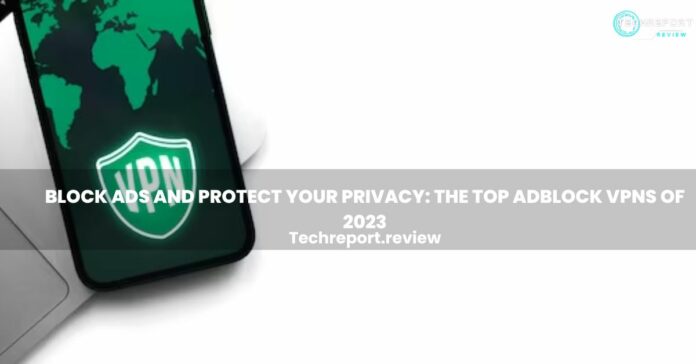Block Ads and Protect Your Privacy: The Top Adblock VPNs of 2023
Are you tired of annoying ads popping up everywhere while you’re browsing the internet? Have you ever been concerned about your online privacy and security? If the answer is yes, then an adblock VPN might just be the solution you need.
An adblock VPN is a type of virtual private network that not only encrypts your internet traffic but also blocks advertisements from appearing on your screen. By using an adblock VPN, you can browse the web without any unwanted interruptions, and your online privacy and security are also enhanced.
The best adblock VPNs have a wide range of features, including strong encryption, fast connection speeds, and compatibility with multiple devices. They also have a user-friendly interface and reliable customer support to ensure that you have a seamless browsing experience.
In this blog, we’ll be discussing the top adblock VPNs in the market and what makes them stand out. We’ll also provide you with some useful tips on how to choose the right adblock VPN for your needs.
So, if you’re looking for a way to browse the internet with ease and peace of mind, keep reading!
What is VPN?

A VPN, or Virtual Private Network, is a tool that allows you to create a secure and private connection to the internet. When you use a VPN, your device connects to a remote server and all your online activity is routed through that server, which acts as a buffer between your device and the internet. This means that all your internet traffic is encrypted and hidden from prying eyes, making it more difficult for anyone to track your online activity, steal your personal data or monitor your internet traffic.
In simpler terms, a VPN creates a secure tunnel between your device and the internet, providing you with privacy, security, and anonymity. It can also help you access content that may be restricted in your region by masking your IP address and location.
Using a VPN is becoming increasingly important in today’s digital age, where cybercrime and online surveillance are on the rise. By using a VPN, you can protect yourself and your online identity from potential threats, and ensure that your personal data remains private and secure.
One of the key benefits of using a VPN is that it can help you to bypass online censorship and geo-restrictions. For example, if you’re traveling in a country where certain websites or services are blocked, you can use a VPN to connect to a server in a different location and access those sites as if you were in a different country.
Another important benefit of using a VPN is that it can help to protect your privacy and keep your online activities anonymous. By encrypting your internet traffic, a VPN ensures that your data cannot be intercepted or monitored by anyone, including your ISP, the government, or other third parties.
What you should look for in Ad blocking VPN?

When it comes to selecting an ad-blocking VPN, there are a few key features that you should keep in mind. Firstly, ensure that the VPN has an ad-blocker feature that can help prevent unwanted ads from interrupting your browsing experience. Additionally, you should also consider the inclusion of antimalware and anti-phishing protection to safeguard your device against any malicious attacks.
Furthermore, extra security features such as strong encryption and tunneling protocols should also be a priority. These features can provide complete protection and ensure that your online activities remain private and secure. You should also look for a VPN that offers compatibility with multiple devices, as securing only one device is not enough to guarantee overall security.
Finally, it is crucial to select a VPN that adheres to a strict no-logs policy. This ensures that the VPN provider will not collect or retain any of your data or online activities, thus safeguarding your privacy. By considering these factors, you can find an ad-blocking VPN that provides a secure, ad-free browsing experience while also protecting your online privacy.
- Ad-blocking feature: Make sure the VPN provider you choose has an ad-blocking feature to eliminate unwanted ads and pop-ups.
- Antimalware protection: The VPN should also provide antimalware protection to safeguard against malware and phishing scams.
- Extra security features: Look for a VPN that provides strong encryption and tunneling protocols to ensure complete protection.
- Multiple device compatibility: Choose a VPN that allows you to protect multiple devices simultaneously to ensure all your devices are secure.
- No-logs policy: The best VPNs with ad-blockers do not collect user data, so make sure the provider you choose has a strict no-logs policy to protect your privacy.
Benefits of using an Ad-Blocking VPN

As we mentioned earlier, using an ad-blocking VPN can help you enjoy a safer and more secure browsing experience. Here are some of the benefits you can expect:
Improved Security
Using an ad-blocking VPN can significantly improve your online security. By blocking ads, you reduce the chances of accidentally clicking on a malicious ad that could potentially infect your device with malware. Additionally, ad-blockers often have built-in anti-phishing features that can help protect you from phishing scams that attempt to trick you into sharing sensitive information.
A good ad-blocking VPN will also offer strong encryption and tunneling protocols, which means that your internet traffic is secured and protected from prying eyes. This is especially important if you frequently use public Wi-Fi networks, as these networks can be easily compromised by hackers looking to steal your personal information. With an ad-blocking VPN, you can browse the internet with peace of mind knowing that your online activity is secure and private.
Finally, using an ad-blocking VPN with a no-logs policy ensures that your personal information and browsing history is not being collected and stored by your VPN provider. This further enhances your online privacy and security, as your data remains confidential and only accessible to you. By using an ad-blocking VPN, you can enjoy a safer and more secure online experience.
Enhanced Privacy
One of the biggest benefits of using an ad-blocking VPN is enhanced privacy. By routing your internet traffic through a VPN, you can mask your IP address and encrypt your online activities, making it much harder for advertisers, ISPs, and even government agencies to track your online movements.
When you connect to a VPN, your IP address is replaced with the IP address of the VPN server. This means that any website you visit or app you use will only see the IP address of the VPN server and not your own IP address. This makes it much more difficult for third parties to track your online activities and associate them with your real-world identity.
In addition to masking your IP address, a good ad-blocking VPN also encrypts your internet traffic. Encryption scrambles your data so that anyone who intercepts it cannot read it without the decryption key. This means that even if someone does manage to intercept your internet traffic, they won’t be able to read it and get access to your sensitive information.
Another way that ad-blocking VPNs enhance privacy is by preventing your internet service provider (ISP) from tracking your online activities. ISPs are known to monitor their customers’ online activities and sell that data to advertisers. By using an ad-blocking VPN, you can prevent your ISP from seeing what websites you visit or what apps you use.
Overall, using an ad-blocking VPN is an effective way to enhance your privacy online. By masking your IP address, encrypting your internet traffic, and preventing your ISP from tracking your online activities, you can surf the web with greater peace of mind, knowing that your online activities are protected from prying eyes.
Faster Browsing
With an ad-blocking VPN, you can expect faster browsing speeds compared to browsing without one. This is because ads can slow down your browsing experience. Not only do ads take up bandwidth, but they can also cause a delay in loading pages. By blocking ads, you reduce the amount of data that needs to be downloaded, resulting in faster page loading times.
Additionally, an ad-blocking VPN can help you avoid bandwidth throttling by your ISP. Internet Service Providers may limit your bandwidth when you are using certain websites or services. This can result in slower browsing speeds. By using an ad-blocking VPN, you can hide your internet traffic and avoid being targeted by your ISP. This will help you enjoy faster browsing speeds consistently.
Moreover, a good ad-blocking VPN has servers located all around the world, which can help you bypass geographic restrictions and access content that is not available in your location. When you connect to a server located in a different country, your internet traffic is routed through that server, making it appear as if you are browsing from that location. This can help you access websites and content that may be restricted in your location, which can ultimately enhance your browsing experience.
Overall, an ad-blocking VPN can provide you with faster browsing speeds and a more seamless browsing experience by blocking ads, avoiding ISP throttling, and bypassing geographic restrictions.
Better User Experience
A major benefit of using an ad-blocking VPN is a better user experience. Online ads can be intrusive and annoying, constantly bombarding users with pop-ups, banners, and autoplay videos. They can also slow down web browsing and make it more difficult to find the content you’re looking for. With an ad-blocking VPN, you can eliminate these distractions and enjoy a smoother, more streamlined browsing experience.
By blocking ads, an ad-blocking VPN can also improve website load times. Ads can be a major source of bloat, and some studies have found that they can account for up to 79% of a website’s data usage. By eliminating this unnecessary content, an ad-blocking VPN can help websites load more quickly, reducing the time users have to spend waiting for pages to load.
In addition to faster load times, an ad-blocking VPN can also help users avoid potentially malicious ads. Some ads can be used to deliver malware, spyware, or other types of viruses, putting users’ security and privacy at risk. By blocking ads from known malicious sources, an ad-blocking VPN can help keep users safe online.
Another way an ad-blocking VPN can improve the user experience is by allowing users to bypass geographical restrictions on content. Some websites and streaming services are only available in certain countries, and accessing them from other locations can be difficult or impossible. With an ad-blocking VPN, users can mask their IP address and appear as if they’re accessing content from a different country, allowing them to access content that would otherwise be unavailable.
Overall, by blocking intrusive ads, improving website load times, enhancing security, and allowing users to bypass geographical restrictions on content, an ad-blocking VPN can significantly enhance the user experience.
Cost Savings
Cost savings is another major advantage of using an ad-blocking VPN. By blocking ads and trackers, you reduce the amount of data that is downloaded to your device, which can help you save money on your internet bill. With less data being downloaded, you can potentially reduce your monthly data usage and avoid costly overage charges.
Moreover, some ad-blocking VPNs offer built-in data compression features that can further reduce data usage and save you money. These compression features work by compressing the data that is sent to and from your device, which can help to reduce the amount of data you use and the time it takes to load web pages.
Another cost-saving benefit of using an ad-blocking VPN is that you may be able to avoid paying for premium versions of certain apps and websites that require a subscription to remove ads. With an ad-blocking VPN, you can block the ads and access premium content without having to pay for it. This can be particularly useful for users who frequently use streaming services, which often have premium subscription plans that remove ads.
In addition, many ad-blocking VPNs offer money-back guarantees or free trials, so you can try out the service before committing to a subscription. This can help you save money by ensuring that you’re happy with the service before you pay for it.
Overall, using an ad-blocking VPN can help you save money on your internet bill, avoid overage charges, reduce data usage, access premium content without paying for it, and take advantage of money-back guarantees and free trials.
Multiple Device Protection
Using an ad-block VPN with multiple device protection offers a significant advantage in terms of convenience and peace of mind. With the ever-increasing number of internet-enabled devices in our lives, it’s becoming more challenging to ensure that all of them are secure and protected from online threats.
Fortunately, many ad-blocking VPNs offer multiple device protection, allowing you to secure all your devices, from laptops and desktops to smartphones and tablets, with a single subscription. This means that you can enjoy the benefits of ad-blocking and enhanced online privacy on all your devices, without having to purchase multiple subscriptions or configure each device individually.
In addition to convenience, multiple device protection with an ad-blocking VPN can also offer cost savings. Instead of purchasing separate subscriptions for each device, you can save money by opting for a single subscription that covers all your devices.
Another advantage of multiple-device protection is that it can help ensure that all your devices are running the latest security software and updates. With a single subscription, you can ensure that all your devices are protected against the latest online threats, without having to worry about individually updating each device.
Overall, using an ad-blocking VPN with multiple device protection can offer numerous benefits, including convenience, cost savings, and enhanced security. If you have multiple devices, it’s definitely worth considering a VPN that offers this feature to ensure that all your devices are secure and protected.
Top Ad-Blocking VPNs
In this section, we will be discussing the top ad-blocking VPNs that you can consider for your online security and privacy needs. We have carefully selected and analyzed these VPNs based on their ad-blocking capabilities, security features, privacy policies, user experience, and pricing. We hope that this section will help you make an informed decision while choosing the right ad-blocking VPN for your online activities.
10. Mullvaad VPN

Mullvad VPN is a VPN service provider owned by parent company Amagicom AB. The name Amagicom derives from the Sumerian word ama-gi, which is the oldest word for “freedom” or “back to mother” in the context of slavery, and the abbreviation for communication. What sets Mullvad apart from other VPN services is their commitment to privacy and security. They offer an anonymous account registration process and do not require any personal information, not even an email address.
They also encourage anonymous payments through cash or cryptocurrency. In addition, Mullvad does not log any of their users’ activity, and their long-term goal is to not even store payment details. Mullvad has also undergone external audits of their app and infrastructure to provide transparency and improve their security practices. They are based in Sweden, which has laws that make their location a safe place for both the company and their users’ privacy. Mullvad’s app is designed to be user-friendly, and they have an in-house support team that works alongside their developers to provide knowledgeable answers to their users’ questions. Mullvad VPN is an excellent choice for users who value privacy and security, as well as simplicity and ease of use.
Pros and Cons of Mullvad VPN
| Pros | Cons |
| Requires no email or account information | Awkward desktop interface |
| Extremely affordable | Servers in a small range of countries |
| Radically transparent | Customer service isn’t great |
| Some advanced features, including multi-hop and port forwarding | Doesn’t work with most streaming services |
| Very good speeds across most servers | Website could be more informative |
| Only supports secure VPN protocols (OpenVPN and WireGuard) | Pay-as-you-go system may confuse some customers |
| IPv6 support | |
| Strict no-logging policy | |
| Multihop servers (Bridge) | |
| VPN kill switch | |
| Provides ad-blocking DNS servers | |
| Works in China (Bridge/Shadowsocks) |
9. TunnelBear

TunnelBear is a Canadian-based VPN service that aims to provide an easy-to-use and accessible VPN option for users who value privacy. One of the main selling points of TunnelBear is its user-friendly and playful design, which aims to make the VPN experience more enjoyable for users. TunnelBear offers apps for Windows, macOS, Android, and iOS, as well as a Chrome extension. The company has a strict no-logging policy, and only collects minimal information required to provide its service, such as your email address and payment information.
TunnelBear’s VPN service uses strong encryption protocols, including OpenVPN, IKEv2, and IPSec, to secure user traffic. Additionally, the service has a VPN kill switch, which automatically stops all internet traffic if the VPN connection drops, protecting your online privacy. TunnelBear also offers a range of features, including its GhostBear technology, which makes your VPN traffic look like regular internet traffic to bypass VPN blocks, and the ability to select specific servers for more advanced users.
One downside of TunnelBear is that it has a relatively small network, with servers in only 41 countries. This can limit the number of options for users who need to connect to specific locations. Additionally, TunnelBear’s free version has a data limit of 500MB per month, which may not be enough for many users.
Pros and Cons of TunnelBear
| Pros | Cons |
| Free plan | Unstable speeds |
| Owns its DNS servers | 500 Mb per month for free |
| Colourful animated UI | Leaks unprotected traffic |
| Supports all major platforms | Doesn’t support certain modern platforms |
| Kill Switch | No settings for alternative VPN clients and routers |
| Strong security features | Limited functionality on iOS |
| Clear Terms of Service | Unstable connections |
| Fun theme | No live chat support |
| Easy to set up | Can be slow |
| Average at unblocking streaming sites | |
| Somewhat expensive |
8. PureVPN

PureVPN is a virtual private network (VPN) provider that was founded in 2007 and is based in Hong Kong. It has grown to become one of the most popular VPN services worldwide, with over 6,500 servers in more than 140 countries. PureVPN offers a wide range of features, including fast connections, strong encryption, unlimited bandwidth, and a strict no-logging policy. It supports all major platforms and devices, including Windows, macOS, iOS, Android, Linux, routers, and more. PureVPN is also compatible with all major VPN protocols, including OpenVPN, L2TP/IPSec, PPTP, IKEv2, and SSTP.
One of the standout features of PureVPN is its split tunneling feature, which allows users to route specific traffic through the VPN while other traffic is routed through the user’s regular internet connection. This feature can be particularly useful for users who want to access certain websites or services that are blocked in their country, while still being able to use local services or access local content. PureVPN also offers a variety of other advanced features, such as port forwarding, DDoS protection, and a kill switch.
In terms of pricing, PureVPN offers a range of subscription options, including monthly, yearly, and biennial plans. The service also offers a 7-day trial for just $0.99, which allows users to test out the service before committing to a longer-term subscription. PureVPN is also known for offering frequent discounts and promotions, making it an affordable option for users who are looking for a reliable and feature-rich VPN service.
Pros and Cons of Pure VPN
| Pros | Cons |
| AES-256 encryption | Limited Linux app |
| Unblocks Netflix | Connection issues |
| Supports torrenting | Some features don’t work with WireGuard |
| No DNS leaks | PureVPN connection problems (not connecting) |
| Compatible with Android TV | Inconsistent and slow speeds |
| Supports port forwarding | Expensive prices for long-term subscriptions |
| 31-day money-back guarantee | DNS leaks |
| Password manager add-on | Clunky VPN apps |
| Cheap one-week trial | PureVPN logged user data for the FBI |
| Live chat support | Does not work well with Netflix and streaming |
| Some decent features |
7. CyberGhost

CyberGhost is a Romanian-based VPN provider that has been in operation since 2011. The company offers a user-friendly VPN service that is designed to protect users’ online privacy and security. With over 6,500 servers in 90 countries, CyberGhost provides a reliable and fast VPN connection for its users.
One of the unique features of CyberGhost is its ability to unblock popular streaming services such as Netflix, Hulu, and BBC iPlayer. This is made possible through its specialized servers that are optimized for streaming.
CyberGhost uses advanced encryption protocols, including AES 256-bit encryption and OpenVPN, to ensure that users’ online activity is secure and private. The company has a strict no-logs policy, which means that it does not store any information about its users’ online activity.
CyberGhost provides easy-to-use VPN apps for all major platforms, including Windows, Mac, iOS, and Android. The apps are designed to be user-friendly, even for those who are not tech-savvy. Additionally, the company offers a 45-day money-back guarantee for users who are not satisfied with their service.
Pros and Cons of CyberGhost
| Pros | Cons |
| Exceptional speeds | Doesn’t work reliably from China or the UAE |
| Earned a perfect score in our privacy and security check | No apps for routers |
| Allows seven simultaneous connections | Parent company has a poor reputation |
| Live chat support | No option to allow local networking |
| Zero logs | Apple apps have fewer features |
| Colossal server coverage | Unintuitive Linux client |
| Unblocks streaming platforms | WireGuard connection problems on Mac |
| WireGuard protocol | |
| Specialized servers | |
| Free trial | |
| 45-day money-back guarantee | |
| Accepts cryptocurrency payments |
6. Atlas VPN

Atlas VPN is a virtual private network service that offers free and paid subscription plans to users. It is designed to provide fast and secure online browsing, with no logs, no tracking, and no data sharing. Atlas VPN uses advanced encryption technologies to keep users’ data safe and secure, while also providing access to geo-restricted content and protecting users’ privacy online. The service is available on multiple platforms, including Windows, macOS, iOS, and Android, and offers unlimited bandwidth and data usage for its paid subscribers. With its user-friendly interface, Atlas VPN is a popular choice for people looking to protect their online privacy and access content from around the world.
Pros and Cons of Atlas VPN
| Pros | Cons |
| Unblocks most streaming services | Based in the US |
| Includes web filters | Small server fleet |
| WireGuard® protocol | Apps are basic and lack customization |
| Live support | Small server network |
| Built-in 2FA login | 5GB monthly data cap on the free plan |
| Free version | Based in the US (Five Eyes country) |
| 30-day money-back guarantee | No browser extensions |
| Both payment tiers work with US Netflix & other streaming sites | Logging policy hasn’t been audited |
| Fast speeds using WireGuard |
5. IPVanish

IPVanish is a Virtual Private Network (VPN) service provider based in the United States. It was founded in 2012 and has grown to become one of the most popular VPN services on the market. IPVanish offers a fast and reliable service with over 1,600 servers in more than 75 locations worldwide. It is known for its strong encryption, unlimited bandwidth, and ability to unblock popular streaming services like Netflix and Hulu. Additionally, IPVanish offers a range of advanced features such as a kill switch, split tunneling, and SOCKS5 web proxy. IPVanish has a strict no-logs policy, ensuring that users’ online activity is not tracked or stored. The service is compatible with a wide range of devices, including Windows, Mac, iOS, Android, and Linux. It offers 24/7 customer support via live chat and email.
Pros and Cons of IPVanish
| Pros | Cons |
| One of the cheapest yearly options | Price increases after a year |
| Geographically diverse servers | Doesn’t work in China |
| Unlimited connections | Relatively slow WireGuard downloads |
| Free SOCKS5 proxy | Dated user interface |
| No-logs policy | Based in the United States |
| Military-grade encryption | Multiple recent ownership changes |
| Kill-switch | Limited streaming capabilities |
| Fast speeds | High price with subscription renewals |
| Great customer support | Limited refund policy |
| WireGuard support | |
| A large range of VPN apps | |
| Good encryption and privacy features | |
| Good for torrenting | |
| Multiple support options including live chat | |
| Low initial price | |
| Unlimited simultaneous connections |
4. ProtonVPN

ProtonVPN is a Swiss-based VPN service that was created by the same team behind ProtonMail, a popular encrypted email service. The company has a strong focus on privacy and security, and their VPN service is no exception. ProtonVPN offers a range of features designed to protect your online privacy, including strong encryption, a no-logs policy, and support for the Tor network.
One of the standout features of ProtonVPN is its use of Secure Core servers. These are servers that are located in countries with strong privacy laws and are designed to provide an extra layer of security for your data. When you connect to a Secure Core server, your traffic is first routed through a series of other Secure Core servers before it reaches its final destination. This makes it much more difficult for anyone to intercept or monitor your online activity.
ProtonVPN also offers a range of other security features, including DNS leak protection, a kill switch, and support for the IKEv2/IPSec and OpenVPN protocols. The service also offers a range of subscription plans to suit different needs, including a free plan with limited features and a premium plan with access to all features and unlimited data.
ProtonVPN has received praise for its commitment to privacy and security, as well as its strong feature set. However, some users have noted that the service can be slow at times, and that its user interface can be somewhat confusing. Additionally, ProtonVPN’s prices are somewhat higher than those of some of its competitors.
Pros and Cons of ProtonVPN
| Pros | Cons |
| Great free version | Premium pricing |
| Unblocks streaming services, including Netflix | Customer support response times can be slower |
| Supports torrenting | Only three server locations |
| User-friendly | Doesn’t work with Netflix |
| Offers open-source apps | Blocks all torrenting traffic |
| 30-day money-back guarantee | Doesn’t bypass Chinese censorship |
| Improved Mac version features | No live chat customer support |
| Unlimited bandwidth | |
| Private logging policy | |
| Includes a kill switch & other security features | |
| Fast short distance speeds | |
| Open-sourced & audited apps | |
| No payment details are required |
3. NordVPN

NordVPN is a popular Virtual Private Network (VPN) service provider headquartered in Panama. The company was established in 2012 and has grown to become one of the most well-known VPN services available. NordVPN offers robust privacy and security features, a user-friendly interface, and a wide network of servers in various countries.
One of NordVPN’s standout features is its advanced security protocols, including Double VPN, which routes your internet traffic through two separate VPN servers for enhanced privacy and security. It also has CyberSec, which blocks ads, trackers, and malware. NordVPN operates under a strict no-logs policy, ensuring that your browsing data is not tracked or recorded.
In addition to its security features, NordVPN is also known for its ability to unblock popular streaming services like Netflix, Hulu, and Amazon Prime Video, allowing users to access geo-restricted content from anywhere in the world. The service also supports P2P file sharing and torrenting on certain servers.
NordVPN offers a variety of pricing plans, including a 30-day money-back guarantee and a 7-day free trial for mobile users. The service can be used on up to six devices simultaneously, making it a good choice for households with multiple devices. The company also offers 24/7 customer support via live chat and email.
Pros and Cons of NordVPN
| Pros | Cons |
| Minimal data logging | Static IP addresses |
| Located in Panama | Additional Softwares |
| Strong encryption standards | Installation issue on iOS |
| No-Log Policy | No app on Linux |
| Premium design | Inconsistent in China |
| Six simultaneous connections | Cheaper Alternatives |
| Works flawlessly with Netflix and Torrenting | |
| Privacy Technology | |
| Intuitive Design | |
| Works with all Streaming Services | |
| Allows Torrenting | |
| 5,600 Servers in 59 Countries | |
| Cheaper than Premium Rivals | |
| Onion over VPN | |
| Constant Innovation |
2. Express VPN

ExpressVPN is a virtual private network service provider based in the British Virgin Islands. It was founded in 2009 and has since grown to become one of the most popular VPN services in the market. ExpressVPN offers a wide range of features to ensure that users enjoy a safe and private online experience.
One of the primary features of ExpressVPN is its robust security measures. It uses the latest encryption standards, including AES-256, to keep user data secure. It also has a no-logs policy, meaning that it does not collect or store any user data.
ExpressVPN boasts a vast network of servers in 94 countries, allowing users to access content from anywhere in the world. It also supports a range of devices, including Windows, Mac, iOS, Android, Linux, and routers. With one subscription, users can protect up to five devices simultaneously.
In addition to security and access features, ExpressVPN also offers excellent customer support. Its 24/7 live chat support is available to help users with any issues they may encounter. ExpressVPN also offers a 30-day money-back guarantee, ensuring that users can test the service risk-free.
Pros and Cons of ExpressVPN
| Pros | Cons |
| Very fast speeds across all server locations | Slightly more expensive than rivals |
| Advanced security on both apps and servers | Streaming servers aren’t labeled |
| Works with most streaming sites from abroad | Price |
| Works in China and the UAE | Design |
| Zero logs policy | 3,000 Servers in 94 Countries |
| 24/7 live chat support | No app on Linux |
| RAM Servers | |
| Lightway Protocol | |
| Intuitive Design | |
| No-Log Policy | |
| Independent Audits | |
| Works with all Streaming Services | |
| Allows Torrenting | |
| 5 Simultaneous Connections | |
| Constant Innovation | |
| Free Password Manager |
1. SurfShark

Surfshark is a VPN service that offers powerful ad-blocking capabilities to users. It uses a combination of DNS-level blocking and CleanWeb technology to block ads, trackers, malware, and phishing attempts. This VPN also provides robust security features like AES-256 encryption, a kill switch, and MultiHop, which routes your traffic through multiple servers for extra privacy.
Moreover, Surfshark allows you to connect an unlimited number of devices simultaneously, making it an excellent choice for families or small businesses. The VPN also has a strict no-logs policy and is based in the privacy-friendly British Virgin Islands. It is also compatible with major operating systems and offers 24/7 customer support.
In summary, Surfshark is an excellent choice for those looking for a reliable and affordable VPN that also provides top-notch ad-blocking capabilities.
Pros and Cons of SurfShark
| Pros | Cons |
| Fast WireGuard protocol performance | No split tunneling on iOS |
| Trustworthy security tools | Apple products are less developed |
| GPS-spoofing feature | Limited support for VPN routers |
| Has an ad blocker | Average OpenVPN speeds (use WireGuard) |
| Attractively cheap | |
| Unlimited connections | |
| User-friendly apps for all devices and operating systems | |
| CleanWeb feature to block ads, trackers, and malware | |
| Works great with Netflix and many other streaming services | |
| 24/7 live chat support | |
| Strong encryption and security features (audited) |
Overall, each of these top ad-blocking VPNs offer great features and benefits, making it difficult to choose just one winner. However, with its powerful ad-blocking capabilities, unlimited simultaneous connections, and affordable pricing, Surfshark is definitely a strong contender. Plus, with its strict no-logs policy and ability to work in China, it’s no wonder why it’s quickly becoming a favorite among VPN users. Regardless of which VPN you choose, always remember to prioritize your online privacy and security.
Common Issues with Ad-Blocking VPNs and How to Solve Them

Ad-blocking VPNs are a great tool for protecting your privacy and blocking unwanted ads, but like any technology, they can sometimes encounter issues. Here are some of the most common problems that users may experience with ad-blocking VPNs, along with some tips on how to solve them:
1. Slow speeds
Slow speeds can be a common issue when using ad-blocking VPNs, and there are a few reasons why this can happen. One of the main reasons is that the VPN service may not have enough servers or server locations, leading to overcrowding and slow speeds. Another reason may be due to the encryption process used by the VPN, which can slow down the connection.
If you are experiencing slow speeds with your ad-blocking VPN, there are a few things you can try to resolve the issue. First, try switching to a different server location. Sometimes, a particular server may be overloaded with traffic, which can slow down your connection. Switching to a different server can help improve your speeds.
Another solution is to try changing the VPN protocol. Different VPN protocols use different levels of encryption, which can impact the speed of your connection. For example, the OpenVPN protocol offers the strongest encryption but can slow down your connection, while the less secure PPTP protocol offers faster speeds but less security.
Finally, check your internet speed without the VPN turned on. If your internet speed is slow, it could be due to your ISP or other factors unrelated to the VPN. You can use online speed testing tools to measure your internet speed and compare it to the speed you get with the VPN turned on. If your internet speed is slow even without the VPN, you may want to contact your ISP for further assistance.
2. Connectivity issues
Connectivity issues can be a common problem when using an ad-blocking VPN. These issues can manifest in several ways, including intermittent connections, slow speeds, and complete disconnections.
One potential cause of connectivity issues is network congestion. When too many users are connected to a single VPN server, the network can become congested, resulting in slower speeds and intermittent connectivity. To solve this issue, try connecting to a different server that is less congested or choose a VPN provider that offers a large number of servers to distribute traffic effectively.
Another possible cause of connectivity issues is a problem with the user’s internet connection. If the user’s internet connection is unstable or slow, it can cause connectivity problems with the VPN. Users should ensure that their internet connection is stable and that there are no issues with their router or modem.
It’s also important to check that the VPN application is updated to the latest version. Outdated software can lead to compatibility issues with the operating system and other applications, leading to connectivity problems.
Lastly, firewalls and antivirus software can sometimes block VPN traffic, resulting in connectivity issues. Users should check their firewall settings and antivirus software to ensure that VPN traffic is not being blocked. Some VPN providers offer specific firewall settings that can be used to bypass these issues.
In summary, connectivity issues can be a common problem when using an ad-blocking VPN, but there are several ways to solve them. Users can try connecting to a different server, ensure that their internet connection is stable, update their VPN application to the latest version, and check firewall and antivirus settings to ensure that VPN traffic is not being blocked.
3. Compatibility issues with certain devices
Compatibility issues are one of the most common problems users may encounter when using an ad-blocking VPN. Sometimes, VPNs may not be compatible with certain devices, resulting in connectivity issues or poor performance.
One common issue is when a VPN is not available on a particular device, such as some smart TVs or gaming consoles. In this case, users can try using the VPN on their router instead. Most modern routers have built-in VPN capabilities and can be configured to work with most VPNs. Alternatively, users can use a virtual router on their computer, which essentially turns their computer into a Wi-Fi hotspot that can be used by other devices.
Another issue is when a VPN is compatible with a device but doesn’t work properly due to the device’s settings. For example, some devices have built-in security features that may interfere with the VPN’s ability to function properly. In this case, users can try disabling these features temporarily to see if it improves the VPN’s performance.
If all else fails, users can always reach out to the VPN’s customer support team for assistance. Most VPN providers have dedicated support teams that can help users troubleshoot any issues they may be having with their service.
4. DNS leaks
DNS (Domain Name System) leaks can occur when your VPN connection fails to hide your actual IP address and DNS requests from your internet service provider (ISP). This means that even if you are connected to a VPN, your ISP can still see the websites you are visiting, rendering the VPN useless for privacy protection.
One of the common reasons for DNS leaks is when your device is configured to use a public DNS server instead of the one provided by your VPN service. This can happen if you manually change your DNS settings or if your device is set to use a public DNS server by default.
Fortunately, fixing DNS leaks is easy. One solution is to use a VPN service that includes a built-in DNS leak protection feature. Another option is to manually configure your device to use the DNS servers provided by your VPN service.
To check if you have a DNS leak, you can use a simple online tool such as DNSLeakTest.com. This tool will display your IP address and the DNS servers being used to resolve domain names. If your actual IP address or public DNS servers are displayed instead of your VPN provider’s information, then you have a DNS leak.
Overall, it’s important to stay vigilant and take steps to ensure that your VPN connection is secure and protecting your privacy at all times.
5. VPN blocking
VPN blocking is an issue that many users encounter when using an ad-blocking VPN. It happens when the internet service provider (ISP) detects that the user is trying to use a VPN and actively blocks the connection. This can happen for a number of reasons, but the most common one is to prevent users from accessing certain websites or content that may be restricted in their country.
If you are experiencing VPN blocking, there are a few things you can try to solve the issue. First, try connecting to a different server location, as some VPN servers may be more likely to be blocked than others. You can also try using obfuscated servers, which are designed to bypass VPN blocking by disguising VPN traffic as regular internet traffic.
Another option is to use a VPN protocol that is less likely to be blocked, such as OpenVPN or WireGuard. Some VPN providers also offer features like split tunneling, which allows you to choose which apps or websites go through the VPN connection and which ones use your regular internet connection. This can help bypass VPN blocking for specific apps or websites.
If you are still experiencing VPN blocking, you can try contacting your VPN provider’s customer support team. They may be able to provide you with additional tips or troubleshooting steps to help you bypass the block. In some cases, they may even offer dedicated IP addresses that are less likely to be detected and blocked by ISPs.
Overall, VPN blocking is an issue that can be frustrating to deal with, but there are several solutions you can try to bypass the block and continue using your ad-blocking VPN as intended.
By following these tips, you can solve common issues with ad-blocking VPNs and ensure that you are getting the most out of your VPN service. Remember that different VPN providers may have different solutions to these problems, so don’t be afraid to reach out to their customer support team for help.
Ad-blocking VPN vs. Ad-Blocker Extension: Which One Should You Use?
When it comes to blocking ads, you have two main options: an ad-blocking VPN or an ad-blocker extension. Both approaches have their benefits and limitations, and the best option for you depends on your needs and preferences.
Ad-Blocking VPNs work by routing your internet traffic through a private server that filters out ads and other unwanted content before it reaches your device. This means that all internet traffic from all apps on your device is filtered, regardless of which app or website you are using. Additionally, ad-blocking VPNs can provide other benefits, such as improved online privacy and security.
On the other hand, ad-blocker extensions work by installing directly onto your web browser, such as Google Chrome or Firefox. These extensions are designed to detect and block ads that appear on the pages you visit. While this approach can be effective, it only filters ads on the specific browser you have installed the extension on.
When deciding which option to choose, consider the following factors:
- Ease of Use: Ad-blocker extensions are generally easier to install and use compared to ad-blocking VPNs. All you need to do is install the extension, and it will start blocking ads immediately. Ad-blocking VPNs, on the other hand, require a bit more setup, such as choosing a server location and connecting to the VPN.
- Device Compatibility: Ad-blocker extensions are typically limited to specific web browsers and may not work on all devices. Ad-blocking VPNs, on the other hand, work across all apps and devices that support VPN connections.
- Level of Protection: While ad-blocker extensions can block ads on the specific web browser they are installed on, they do not provide additional online privacy or security. Ad-blocking VPNs, on the other hand, can encrypt your internet traffic and protect your online activity from prying eyes.
In summary, both ad-blocking VPNs and ad-blocker extensions have their benefits and limitations. If you’re looking for an easy-to-use solution to block ads on a specific web browser, an ad-blocker extension may be the right choice for you. However, if you’re looking for a more comprehensive solution that protects your privacy and blocks ads across all apps and devices, an ad-blocking VPN may be a better fit.
How to Test if Your Ad-Blocking VPN is Working
Once you have chosen an ad-blocking VPN and connected to a server, you may want to ensure that it is working effectively. Luckily, there are a few ways to test this.
The first method is to visit an ad-blocker testing website such as “AdBlockerTest.com” or “Poper Blocker Test.” These sites simulate various ad types to see if they are blocked by your VPN’s ad-blocking feature. Simply visit one of these sites and follow the instructions to run the test. If your ad-blocking VPN is working properly, it should block most or all of the ads.
Another method is to use a browser extension like “uBlock Origin,” “AdBlock Plus,” or “AdGuard.” These extensions are designed to block ads on websites, and they can be used to confirm that your ad-blocking VPN is working as expected. Install the extension on your browser, and then visit a few websites that have ads. If the extension is working and the ads are blocked, then your VPN’s ad-blocking feature is likely working as well.
It’s important to note that ad-blocker testing sites and browser extensions are not perfect tools for testing the effectiveness of ad-blocking VPNs. There are many types of ads and tracking scripts that are constantly evolving, and it can be difficult to test all of them. However, using these tools can provide a good general indication of whether your ad-blocking VPN is working effectively or not.
The Future of Ad-Blocking VPNs
Ad-blocking VPNs are rapidly evolving to meet the growing demand for privacy and security in the digital world. As online advertisers become increasingly sophisticated in their tracking and targeting techniques, the need for robust ad-blocking solutions continues to grow.
One emerging trend in the ad-blocking VPN market is the use of artificial intelligence (AI) and machine learning (ML) to improve ad-blocking capabilities. These technologies enable VPN providers to analyze and filter out ads more effectively, based on a wide range of criteria, including content, context, and user behavior.
Another trend is the growing focus on user experience and ease of use. VPN providers are investing in more user-friendly interfaces, simpler setup processes, and improved customer support, to make it easier for users to take control of their online privacy.
In the future, we can expect to see even more advanced ad-blocking VPNs, with better algorithms and more accurate ad detection capabilities. VPN providers will continue to innovate and differentiate themselves with features such as split-tunneling, multi-hop VPN connections, and custom DNS servers, to provide users with more control over their online experience.
As online privacy and security concerns continue to grow, the demand for ad-blocking VPNs is likely to continue to increase. With new technologies and innovations emerging all the time, the future of ad-blocking VPNs looks bright.
In Crux
In summary, VPNs with ad-blocking capabilities are a great way to enhance your online security and privacy while also improving your browsing experience by blocking annoying ads. When choosing an ad-blocking VPN, look for one with strong security and privacy features, fast speeds, and the ability to bypass geo-restrictions.
We have highlighted some of the top ad-blocking VPNs available on the market today, each with its own unique features and benefits. However, it’s important to note that ad-blocking VPNs are not perfect and may have some limitations and common issues that can be addressed through proper troubleshooting.
Furthermore, we have explored the differences between ad-blocking VPNs and ad-blocker extensions and provided tips on how to test whether your ad-blocking VPN is working correctly.
As the world becomes more privacy-conscious, the future of ad-blocking VPNs looks bright, with emerging trends such as the use of artificial intelligence and machine learning to enhance ad-blocking capabilities. As technology continues to advance, we can expect even more innovative solutions to improve online security and privacy.
In conclusion, choosing an ad-blocking VPN can be an excellent way to protect your online privacy and security while also improving your browsing experience. We hope that this guide has provided you with the information you need to make an informed decision when selecting an ad-blocking VPN that meets your needs.
How much did you like Our detailed Block Ads and Protect Your Privacy: The Top Adblock VPNs of 2023? Review Also, please share these Blogs with your friends on social media.
Related Blogs
[WPSM_AC id=862]
































